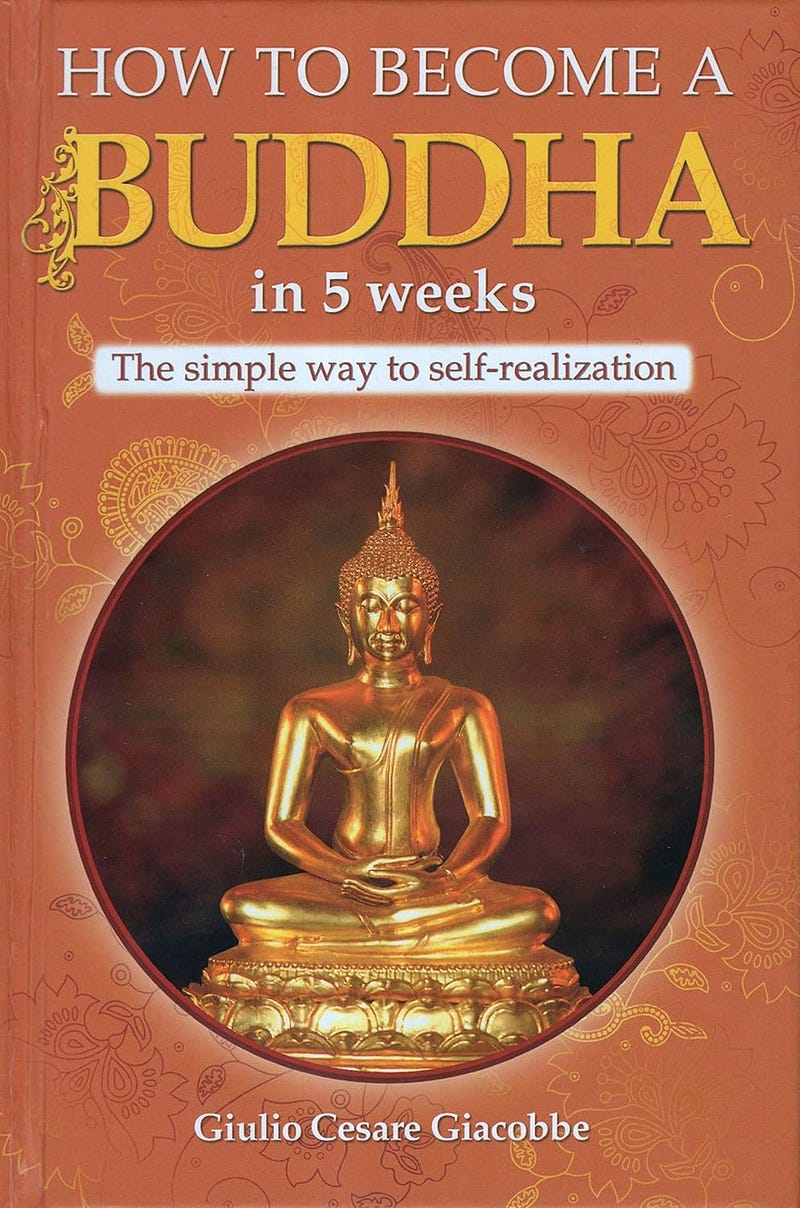Book Review: How to Become a Buddha in 5 Weeks: The Simple Way to Self-Realization by Giulio Cesare Giacobbe

In an age where mindfulness and self-awareness are heralded as pathways to inner peace, Giulio Cesare Giacobbe’s book How to Become a Buddha in 5 Weeks: The Simple Way to Self-Realization emerges as a pragmatic guide for those seeking enlightenment. Far from being steeped in esoteric religious dogma, Giacobbe’s approach is refreshingly grounded in psychological insight, blending Buddhist principles with modern self-help techniques.
A Practical Path to Inner Peace
Giacobbe structures his work around a five-week program designed to transform the reader’s mental state, gradually guiding them toward a Buddha-like serenity. Each week focuses on one core principle, ranging from controlling one’s thoughts to embracing universal love. Through practical exercises and relatable anecdotes, the author demystifies complex spiritual concepts, making them accessible to readers from all walks of life.
Week 1: Mastering the Mind
The journey begins by tackling the root cause of human suffering: our thoughts. Giacobbe posits that negative thinking, often tied to past traumas and subconscious fears, is the principal barrier to peace. He encourages readers to practice detached observation of thoughts, fostering a sense of awareness without judgment. This foundational practice sets the tone for the transformative process to follow.
Key Message: Our thoughts are the primary source of our suffering.
Takeaways:
- Suffering arises from involuntary, negative thoughts rooted in past traumas and unconscious memories.
- By practicing detached observation of our thoughts, we can disidentify from them, reducing their emotional impact.
- Techniques such as mindfulness and focusing on the breath help in achieving mental emptiness and serenity.
Example:
Imagine you’re stuck in traffic and start thinking, “I’m going to be late; my boss will be angry; this always happens to me.” Recognize these thoughts as just mental events, not reality. By observing them without attachment, you can reduce anxiety and remain calm.
Week 2: Living in the Present
The second week focuses on grounding oneself in the present moment. Giacobbe’s assertion that most suffering arises from mental constructs rather than reality itself is both profound and liberating. Techniques such as mindful eating and deep breathing are offered as practical ways to stay anchored in the now, thus freeing the mind from anxiety and regret.
Key Message: Distinguishing between reality and mental constructs is essential for inner peace.
Takeaways:
- Reality consists of the present moment and what we perceive through our senses.
- Many sufferings are products of the mind, not of actual reality.
- By anchoring ourselves in the present, we can reduce unnecessary mental suffering.
Example:
While eating, instead of ruminating about past events or future worries, focus entirely on the taste, texture, and aroma of the food. This practice grounds you in the present and enhances your experience.
Week 3: Embracing Change
Transitioning from a mindset of permanence to one of fluidity, the third week teaches acceptance of life’s inevitable changes. Drawing on Buddhist teachings of impermanence, the author explains that clinging to stability in an inherently changing world is a recipe for suffering. By learning to accept transience, one cultivates resilience and adaptability.
Key Message: Recognizing the impermanent nature of all things leads to enlightenment.
Takeaways:
- Everything in life is in a constant state of flux; clinging to permanence causes suffering.
- Embracing change allows for psychological growth from a childlike to an adult perspective.
- Regularly reminding oneself of life’s transitory nature fosters adaptability and peace.
Example:
If you lose a cherished item, instead of mourning its loss indefinitely, acknowledge that all things are temporary. This understanding helps in letting go and moving forward.
Week 4: The Art of Non-Attachment
Giacobbe’s fourth lesson revolves around letting go. Non-attachment, as he describes, is not about being emotionless or indifferent but about freeing oneself from possessiveness. Whether it’s a cherished relationship or a material possession, detachment allows for appreciation without the anxiety of loss.
Key Message: Letting go of attachments frees us from suffering.
Takeaways:
- Attachments are based on the illusion of permanence.
- By understanding and accepting impermanence, we can release our grip on transient things.
- Non-attachment doesn’t mean indifference but a healthy detachment that allows for genuine appreciation without clinging.
Example:
If a relationship ends, instead of being consumed by loss, appreciate the positive moments shared and accept that change is a natural part of life. This perspective fosters healing and growth.
Week 5: Universal Love
The final chapter, rooted in the principle of loving-kindness, calls for an expansion of empathy beyond oneself. Giacobbe highlights that true self-realization culminates in compassion for all beings. Through guided meditations, he teaches how to cultivate a love that transcends personal desires and societal barriers.
Key Message: Cultivating unconditional love leads to true self-realization.
Takeaways:
- Universal love transcends personal desires and ego.
- It involves empathy, compassion, and a deep connection with all beings.
- This love is not possessive but liberating, fostering a sense of unity and peace.
Example:
Practice loving-kindness meditation by silently repeating phrases like “May all beings be happy; may all beings be safe.” This exercise nurtures compassion and a sense of interconnectedness.
A Bridge Between East and West
Giacobbe’s background as a psychologist lends credibility to his interpretation of Buddhist philosophy. The book’s appeal lies not only in its simplicity but also in its blend of ancient wisdom and contemporary psychology. Readers are invited to experiment with these methods without feeling the pressure to adopt a specific religious identity.
Final Thoughts
In a world often overwhelmed by stress and division, How to Become a Buddha in 5 Weeks offers a structured, attainable approach to personal growth. It is both a spiritual guide and a psychological toolkit, making it invaluable for those seeking to align their minds with the tranquility of the Buddha. Thought-provoking and insightful, Giacobbe’s work deserves a place among the modern classics of self-realization literature.
No comments:
Post a Comment